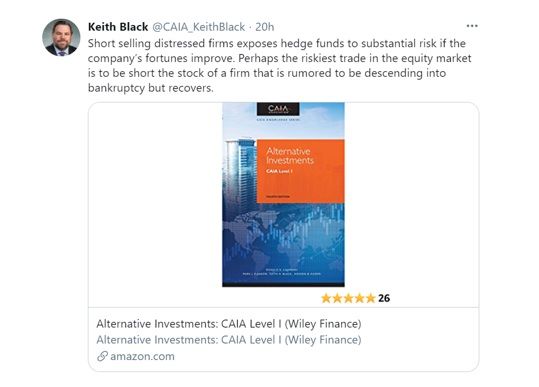By Aaron Filbeck, CFA, CAIA, CIPM, FDP The last time I saw so many newly minted investment experts on social media was four years ago, December 2017. Bitcoin had hit all-time highs, and the dreaded feeling of FOMO was causing clients to move as quickly as they could to get in on the action. I’m also struck by a recent tweet from my colleague, Keith Black, with a nice plug to the CAIA Program where we cover these types of events extensively:  I guess, sometimes, we all need a reminder in proper risk management. Perhaps this recent activity in the market really puts the “smart money vs. dumb money” argument into question. The gamification of investing was meme-worthy in 2020, but the recent news of long/short hedge funds becoming targets of r/wallstreetbets has shown the power retail investors have in hitting where it hurts…just as much as their institutional counterparts in 2021. This, to me, is a three-way battle between risk management, education, and ethics. It’s astounding the lack of risk management on the part of supposedly smart investors, who decided that piling onto short interest statistics greater than the shares outstanding (potentially signaling naked shorting, which is illegal) was a great idea. What’s equally astounding are the questionable ethics of the speculators who pumped up a stock’s price to the moon. But I think, even more importantly, this is a great example of what happens when markets are democratized without proper education. I’m not upset about a bunch of individual investors making a boatload of money, why should that privilege be saved for the institutional investors only? These traders found an inefficiency and exploited it.What concerns me is the behavior of the crowds today – long or short. Trading apps have made themselves addictive, and companies have simply become tickers on a page. The “smart” money has apparently become lax on risk management and the retail investors have begun to focus exclusively on price, buying what they don’t understand just to get an extra shot of dopamine as that price skyrockets. If they were at a casino, wouldn’t we label this a gambling problem? We’ll always be doomed to repeat the past mistakes of previous market cycles if we don’t break the current habits. Portfolio managers should know better. In the case of retail investors, simply restricting trades (as Robinhood did) doesn’t teach retail investors anything, it just enrages them. Instead, the industry (professionals and trading apps alike) need to find better ways to educate and empower the investor to make informed decisions. The behavior of the past few days only displays that we have a long way to go in that regard. When newbies are turning to “experts” on TikTok for financial advice, we’re in trouble. It’s all fun and games until the SEC investigates you, bubbles pop, and the GameStops. Aaron Filbeck, CFA, CAIA, CIPM, FDP is Director of Global Content Development at CAIA Association. You can follow him on Twitter and LinkedIn.
I guess, sometimes, we all need a reminder in proper risk management. Perhaps this recent activity in the market really puts the “smart money vs. dumb money” argument into question. The gamification of investing was meme-worthy in 2020, but the recent news of long/short hedge funds becoming targets of r/wallstreetbets has shown the power retail investors have in hitting where it hurts…just as much as their institutional counterparts in 2021. This, to me, is a three-way battle between risk management, education, and ethics. It’s astounding the lack of risk management on the part of supposedly smart investors, who decided that piling onto short interest statistics greater than the shares outstanding (potentially signaling naked shorting, which is illegal) was a great idea. What’s equally astounding are the questionable ethics of the speculators who pumped up a stock’s price to the moon. But I think, even more importantly, this is a great example of what happens when markets are democratized without proper education. I’m not upset about a bunch of individual investors making a boatload of money, why should that privilege be saved for the institutional investors only? These traders found an inefficiency and exploited it.What concerns me is the behavior of the crowds today – long or short. Trading apps have made themselves addictive, and companies have simply become tickers on a page. The “smart” money has apparently become lax on risk management and the retail investors have begun to focus exclusively on price, buying what they don’t understand just to get an extra shot of dopamine as that price skyrockets. If they were at a casino, wouldn’t we label this a gambling problem? We’ll always be doomed to repeat the past mistakes of previous market cycles if we don’t break the current habits. Portfolio managers should know better. In the case of retail investors, simply restricting trades (as Robinhood did) doesn’t teach retail investors anything, it just enrages them. Instead, the industry (professionals and trading apps alike) need to find better ways to educate and empower the investor to make informed decisions. The behavior of the past few days only displays that we have a long way to go in that regard. When newbies are turning to “experts” on TikTok for financial advice, we’re in trouble. It’s all fun and games until the SEC investigates you, bubbles pop, and the GameStops. Aaron Filbeck, CFA, CAIA, CIPM, FDP is Director of Global Content Development at CAIA Association. You can follow him on Twitter and LinkedIn.

←
Back to Portfolio for the Future™
Educational Alpha | What Happens When the GameStops?
January 31, 2021



